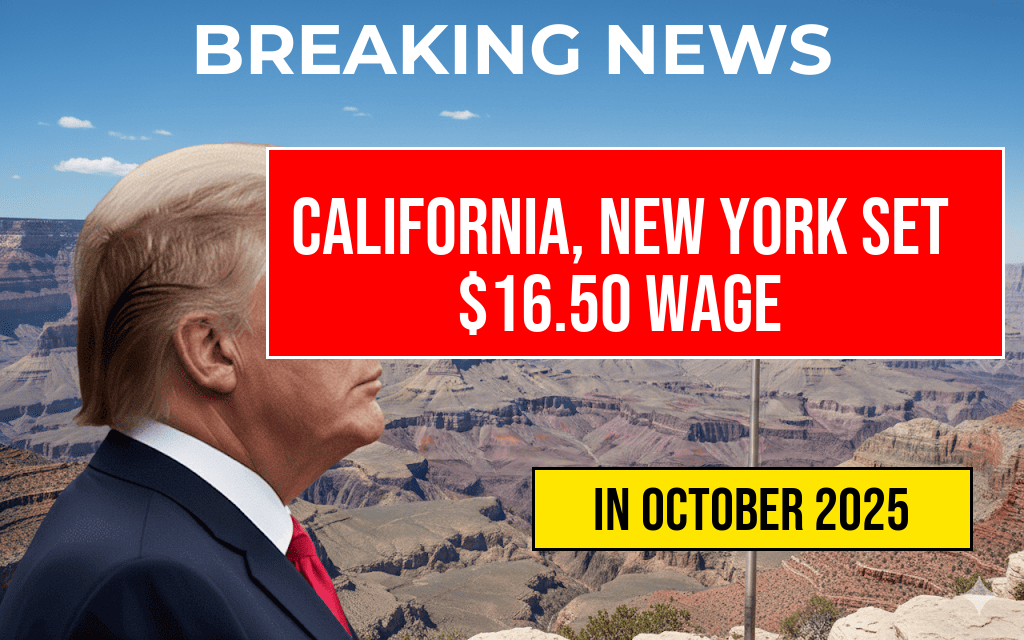California and New York are on the brink of implementing a new minimum wage of $16.50 per hour, a move that could significantly impact millions of workers across both states. This decision comes as part of broader efforts to address rising living costs and provide a more equitable wage for low-income earners. The increase is scheduled to take effect in 2024, with officials emphasizing the importance of adjusting wages to keep pace with inflation and the cost of living. As the nation’s two largest states by population, these changes are expected to set a precedent for other states considering similar measures.
Details of the Minimum Wage Increase
The proposed increase to $16.50 per hour represents a substantial rise from the current minimum wage, which stands at $15.50 in California and $15.00 in New York. In both states, the new wage will provide a boost for workers in various sectors, including retail, hospitality, and healthcare. Lawmakers believe that this raise is essential for improving the quality of life for low-wage workers, particularly in urban areas where the cost of living has skyrocketed.
Impact on Workers and Businesses
- Workers: The increase is expected to help workers cover essential expenses such as housing, food, and transportation. Advocates argue that a higher minimum wage will lift many families out of poverty.
- Businesses: While many employers support the wage increase, concerns have been raised about the potential for increased operational costs. Small businesses may face challenges adapting to the new wage structure, leading to discussions about potential support measures.
Economic Context
The decision to raise the minimum wage reflects ongoing economic challenges faced by workers. According to the U.S. Bureau of Labor Statistics, inflation has significantly eroded purchasing power over the past few years, making it increasingly difficult for low-wage workers to make ends meet. California’s and New York’s economies are among the largest in the U.S., and these states often lead the way in labor reforms, making this decision particularly noteworthy.
Public Response and Political Support
The proposed wage increase has garnered support from various labor unions and advocacy groups. “This is a critical step towards ensuring that all workers receive a fair wage for their labor,” stated a representative from the California Labor Federation. Public opinion polls indicate that a majority of residents in both states favor the wage hike, viewing it as a necessary measure for economic justice.
Potential Challenges Ahead
| Challenge | Description |
|---|---|
| Business Adaptation | Small businesses may struggle to adjust to increased labor costs, leading to potential layoffs or reduced hours. |
| Inflationary Pressures | Some economists warn that raising wages could lead to higher prices for goods and services, potentially counteracting the benefits of increased earnings. |
| Political Opposition | Not all lawmakers are in favor of the increase, citing concerns over its economic impact and job creation. |
Looking Ahead
As California and New York prepare to implement this new minimum wage, other states may look to these changes as a model for their own wage policies. Discussions around minimum wage often include considerations of regional living costs, and the outcome of this increase could influence legislative debates nationwide. Stakeholders in both states are watching closely to assess the full impact of this decision on the economy and the labor market.
For more information on the implications of minimum wage policies, you can visit Forbes and explore historical changes and current debates surrounding wage increases.
Frequently Asked Questions
What is the new minimum wage being implemented in California and New York?
The new minimum wage being implemented in both California and New York is $16.50 per hour.
When will the new minimum wage take effect?
The $16.50 hourly minimum wage is set to take effect in the coming months, with specific dates varying by state.
Who will be affected by this minimum wage increase?
The minimum wage increase will affect all workers in California and New York who are currently earning less than $16.50 per hour.
What is the purpose of raising the minimum wage to $16.50?
The purpose of raising the minimum wage to $16.50 is to help improve the living standards of workers and reduce poverty in high-cost areas like California and New York.
Are there any exceptions to the new minimum wage law?
There may be certain exceptions or specific industries that are not fully subject to the $16.50 minimum wage law, but details will vary by state regulations.

Leave a Reply